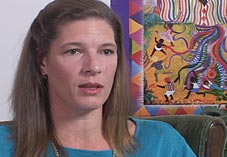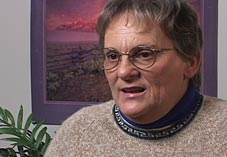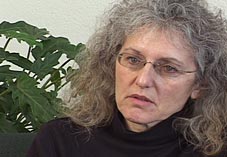 |
|
|
Videos
PO Box 2480Nevada City, CA 95959
Phone/Fax: 800-345-5530
(530-477-0701 outside US and Canada)
Email: info@cavalcadeproductions.com
 A Video Series on Attachment Disorder:
A Video Series on Attachment Disorder:
Children with Disrupted Attachment
A secure attachment system forms the foundation for a child’s development. The often devastating impact of attachment disorder on children’s sense of self, and on their capacity to form attachments with new caregivers, can pose major challenges for foster and adoptive parents, as well as for therapists and group home staff. In this four-video series, the presenters describe the impact of attachment disorder on the ways that children see themselves and interact with others, and how adults can respond most effectively. They explore such topics as setting limits, avoiding power struggles, providing structure, and building a trusting relationship. Their observations are reinforced by the accounts of foster and adoptive parents, group home staff, and former foster children. The presenters emphasize the importance of understanding what drives children’s behaviors, rather than simply reacting to them, and provide concrete suggestions for containing negative behaviors and improving adult-child interactions. Released 2006.
Understanding Children with Disrupted Attachment
Parenting Children with Disrupted Attachment
Caring for Children with Disrupted Attachment
Treating Children with Disrupted Attachment
Purchase price: One VHS/DVD $95, two $175, three $250, set of four $325 Customers who bought this video series also bought: About the Presenters Margaret E. Blaustein, PhD is a clinical psychologist specializing in the treatment of children and families impacted by chronic trauma. She is Director of Education and Training at The Trauma Center in Brookline, Massachusetts. Alexandra Cook, PhD is Director of Development and Evaluation Services at The Trauma Center. She is also co-author of With the Phoenix Rising: Lessons from Ten Resilient Women who Overcame the Trauma of Childhood Sexual Abuse. Richard Kagan, PhD is Director of Psychological Services at Parsons Child and Family Center in Albany, New York. He is author of Rebuilding Attachments with Traumatized Children, Real Life Heroes, and Wounded Angels. Vivienne Roseby, PhD is in private practice in Davis, California, where she specializes in working with attachment and character disorder. She is coauthor of In the Name of the Child and Helping Children in Highly Conflicted and Violent Divorced Families. Thomas Young, MFT was a school psychologist and special education director, and has been in private practice since 1985, specializing in children with attachment disorder. Joseph Benamati, EdD is Director of the Residential Treatment Facility at Parsons Child and Family Center. He was a medic in Vietnam, and has been at Parsons for 22 years. Dawn Flagler is Residential Treatment Facility Transition Coordinator at Parsons Child and Family Center, and has worked in residential care and special education since 1984. Frank Grijalva is a clinical consultant in adolescent residential services, an international trainer in Classroom-Based Intervention, and trained dolphins for the US Navy for 8 years. Forrest Hurd is supervisor at a residential facility for 9- to 11-year old boys near Modesto, California, and has worked in childcare since 2000. Kathy Ryan, LCSW is former Director of Mental Health Residential Services at Parsons Child and Family Center, where she was a childcare worker, social worker, and clinical supervisor. Raymond Schimmer, MAT has been at Parsons Child and Family Center since 1982 as Director of Education, Day Treatment, and Residential Services. He currently serves as Executive Director. Denise and her husband Joe have been doing therapeutic foster care since 1992, and have adopted four children. Mary has been a foster parent for 12 years, and has cared for 98 foster children. Mary Ann has been a foster/adoptive parent for 10 years. Sue and her husband Lee have been therapeutic foster parents for 17 years. The Trainer’s Guide The 60-page trainer’s guide includes objectives, reproducible viewer handouts, review and discussion questions, and a resource list. The appendices include a journal article, a book chapter, and a parent checklist, described below. Kinniburgh, Kristine, & Blaustein, Margaret. Attachment, Self-Regulation, and Competency (ARC): A Comprehensive Framework for Intervention with Complexly Traumatized Youth, Psychiatric Annals, 35(5), 2005, p. 424-430. The Attachment, Self-Regulation, and Competency (ARC) model provides a component-based framework for intervention, and is grounded in theory and empirical knowledge about the effects of trauma. It emphasizes the importance of understanding and intervening with the child-in-context, with a philosophy that systemic change leads to effective and sustainable outcomes. Chapter 6, "Reparenting the Hurt Child", from Richard Kagan’s book, Rebuilding Attachments with Traumatized Children: Healing from Losses, Violence, Abuse, and Neglect (Haworth Press, 2004), discusses community support, countertransference, misbehavior, developing trust, giving directions, choices and consequences, life skills, affect management, matching children and families, reality-based expectations, and psychotropic medications. Vivienne Roseby’s checklist for parents, “The Two Step For Managing Limits, Disappointments and Other Upsets: Relate And Contain,” discusses noticing your child, opening up and being available, verbalizing the limits, and enfolding with safety. |



